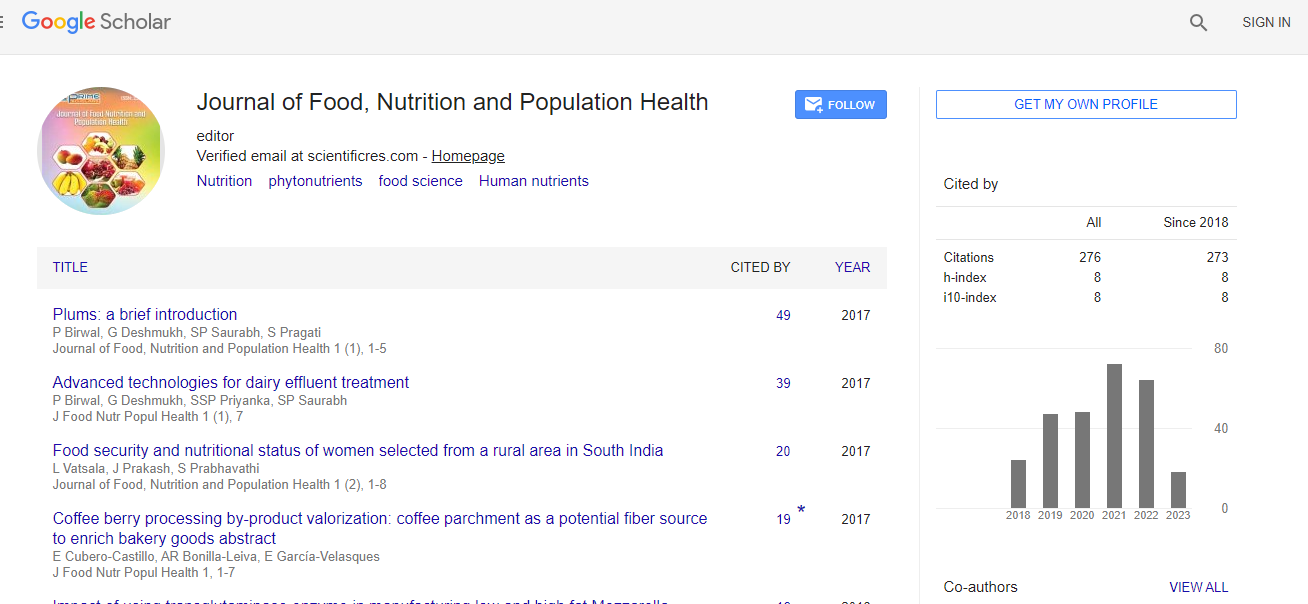Short Communication - (2024) Volume 8, Issue 1
The Intersection of Nutrition and Population Health: Nourishing Communities for a Healthier Future
Muhammad Hazel*
Department of Food Nutrition and Population Health, University of Mosul, Iraq
*Correspondence:
Muhammad Hazel,
Department of Food Nutrition and Population Health, University of Mosul,
Iraq,
Email:
Received: 28-Feb-2024, Manuscript No. IPJFNPH-24-19935;
Editor assigned: 01-Mar-2024, Pre QC No. IPJFNPH-24-19935 (PQ);
Reviewed: 15-Mar-2024, QC No. IPJFNPH-24-19935;
Revised: 20-Mar-2024, Manuscript No. IPJFNPH-24-19935 (R);
Published:
27-Mar-2024, DOI: 10.21767/2577-0586.8.01.06
Introduction
Nutrition plays a fundamental role in population health,
influencing the well-being and quality of life of individuals,
families, and communities. Access to nutritious foods,
balanced diets, and dietary patterns can significantly impact
health outcomes, disease prevention, and overall longevity.
This paper explores the intricate relationship between
nutrition and population health, highlighting the importance
of addressing nutritional challenges to promote the health and
well-being of diverse populations. Dietary factors play a crucial
role in the development and prevention of chronic diseases
such as obesity, diabetes, cardiovascular disease, and certain
cancers. Unhealthy dietary patterns characterized by excessive
consumption of processed foods, sugary beverages, and highcalorie,
nutrient-poor foods contribute to the rising prevalence
of obesity and diet-related conditions. Conversely, adopting
balanced diets rich in fruits, vegetables, whole grains, lean
proteins, and healthy fats can help prevent chronic diseases
and promote long-term health.
Description
Nutritional status varies widely across populations and
demographic groups, contributing to health disparities and
inequalities. Socioeconomic factors such as income, education,
and food access influence dietary patterns, nutritional intake,
and health outcomes. Vulnerable populations, including
low-income individuals, ethnic minorities, and marginalized
communities, often face barriers to accessing nutritious foods,
leading to higher rates of malnutrition, obesity, and diet-related
diseases. Dietary factors play a crucial role in the development
and prevention of chronic diseases such as obesity, diabetes,
cardiovascular disease, and certain cancers. Unhealthy dietary
patterns characterized by excessive consumption of processed
foods, sugary beverages, and high-calorie, nutrient-poor
foods contribute to the rising prevalence of obesity and dietrelated
conditions. Conversely, adopting balanced diets rich
in fruits, vegetables, whole grains, lean proteins, and healthy
fats can help prevent chronic diseases and promote longterm
health. Nutrition plays a critical role in every stage of
the life course, from preconception and pregnancy to infancy,
childhood, adolescence, adulthood, and old age. Adequate
nutrition during pregnancy is essential for maternal health,
fetal development, and long-term health outcomes for both
mother and child. Early childhood nutrition influences growth,
cognitive development, and lifelong eating habits, laying
the foundation for optimal health and well-being. Nutrition
requirements evolve throughout the life course, with specific
nutritional needs during periods of growth, development,
aging, and illness. The global food system and agricultural
practices have significant implications for population health
and environmental sustainability. Unsustainable food
production, distribution, and consumption patterns contribute
to environmental degradation, deforestation, biodiversity loss,
and climate change. Addressing food-related environmental
challenges, promoting sustainable agriculture, and reducing
food waste are essential for safeguarding both human health
and planetary health. Effective policies and public health
interventions are crucial for addressing nutritional challenges
and promoting population health. Strategies such as nutrition
education, food fortification, agricultural subsidies, food
labeling, and taxation can help encourage healthier dietary
choices, improve food access, and reduce the burden of dietrelated
diseases. Community-based initiatives, school nutrition
programs, and healthcare interventions play a vital role in
promoting nutrition education, preventive care, and access to
nutritious foods for all [1-4].
Conclusion
In conclusion, nutrition is a cornerstone of population health,
with far-reaching implications for individuals, communities,
and societies. Addressing nutritional challenges, promoting
access to nutritious foods, and adopting healthy dietary
patterns are essential for preventing chronic diseases, reducing
health disparities, and promoting well-being across the
lifespan. By prioritizing nutrition as a public health priority
and implementing evidence-based interventions, we can
create healthier environments, empower individuals to make
informed dietary choices, and build resilient communities for
a healthier future.
Acknowledgement
None.
Conflict Of Interest
The author’s declared that they have no conflict of interest.
References
- Lloyd K, McGregor J, John A, Craddock N, Walters JT, et al. (2015) A national population-based e-cohort of people with psychosis (PsyCymru) linking prospectively ascertained phenotypically rich and genetic data to routinely collected records: Overview, recruitment and linkage. Schizophrenia Res 166(1):131-136.
[Crossref] [Google Scholar]
- Delnord M, Szamotulska K, Hindori-Mohangoo AD, Blondel B, Macfarlane AJ, et al. (2016) Linking databases on perinatal health: A review of the literature and current practices in Europe. Eur J Pub Health 26(3):422-430.
[Crossref] [Google Scholar]
- Haneef R, Delnord M, Vernay M, Bauchet E, Gaidelyte R, et al. (2020) Innovative use of data sources: A cross-sectional study of data linkage and artificial intelligence practices across European countries. Arch Pub Health 78(1):55.
[Crossref] [Google Scholar]
- Bradley CJ, Penberthy L, Devers KJ, Holden DJ (2010) Health services research and data linkages: Issues, methods, and directions for the future. Health Serv Res 45:1468-1488.
[Crossref] [Google Scholar]
Citation: Hazel M (2024) The Intersection of Nutrition and Population Health: Nourishing Communities for a Healthier Future. J
Food Nutr Popul Health. 8:06.
Copyright: © 2024 Hazel M. This is an open-access article distributed under the terms of the Creative Commons Attribution
License, which permits unrestricted use, distribution and reproduction in any medium, provided the original author and source
are credited.

